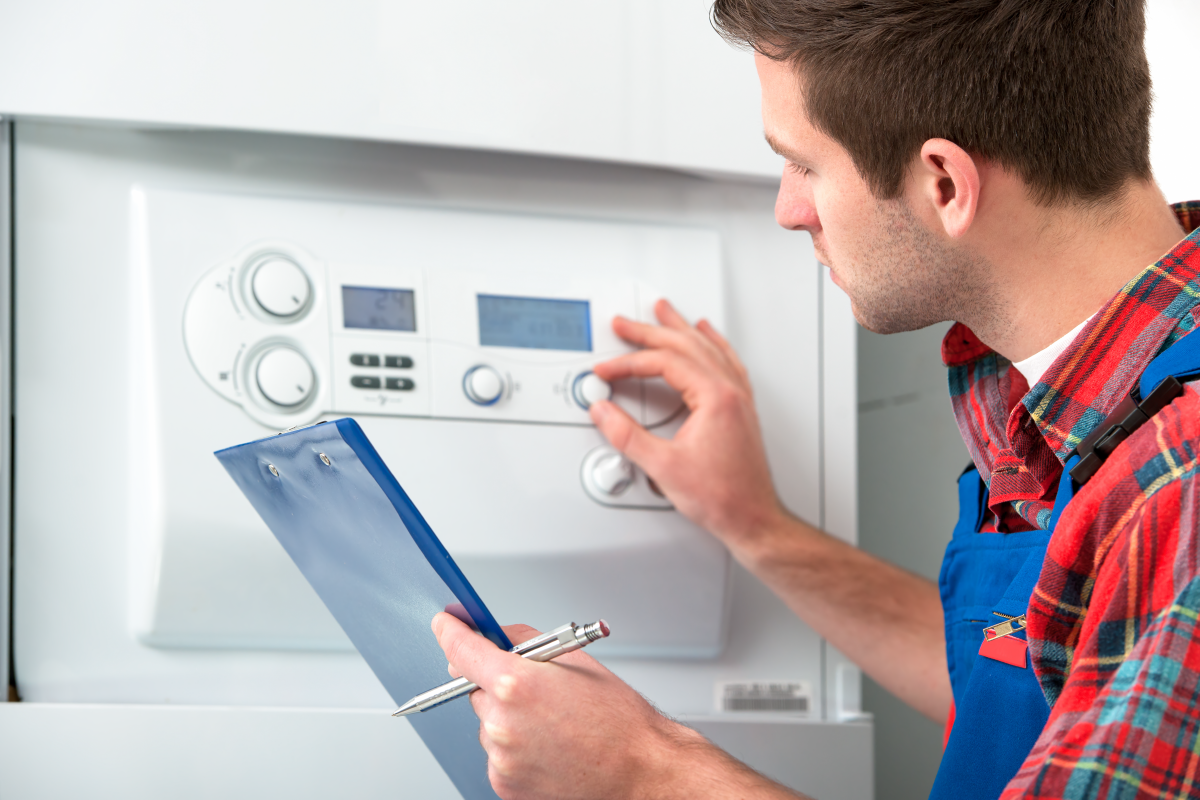Choosing the right HVAC contractor is a major decision and an important investment in your home’s comfort, energy efficiency, and value. The contractor’s expertise can be just as important as selecting the right equipment. Improper installation or sizing can lead to higher energy bills, uneven temperatures, frequent breakdowns, and even a shorter system lifespan.
But how to know if you are choosing the right contractor? In this article, we’ll break down what to do when hiring an HVAC professional step by step and how to make sure the job is done right the first time.
Follow these actionable steps to vet potential companies, understand crucial certifications, and ensure a quality installation. By focusing on key aspects like licensing, reviews, and proper installation practices, you can avoid common pitfalls and make an informed decision for your heating and air conditioning needs.
How to Choose an HVAC Contractor
 Initial Research and Gathering Information
Initial Research and Gathering Information
Before hiring an HVAC contractor, it's very important to do your homework. Taking the time to understand your needs and vet potential contractors can save you time, money, and frustration down the road. Follow these simple steps to learn about your current HVAC system and choose the right contractor for the job.
Step 1: Understand your needs
Before calling contractors, gather information about your current system, starting model and maintenance history.
Take note of any rooms that feel uncomfortable; this will help contractors assess your heating and cooling needs.
If possible, have your furnace and AC system's serial number, model number, brand, and approximate age ready. Taking a photo of the ID tag is recommended.
Step 2: Search for trusted contractors
Start by seeking out real customer experiences. Investing extra time now could save you a lot of time and money later. There are a few effective ways to identify potential contractors:
Ask for recommendations from friends, neighbors, or co-workers.
Use search engines (e.g., Google "HVAC contractor near me") to find local companies.
Check manufacturer websites, which often provide independent "Dealer Locators" with contact information and details for certified contractors.
Contact local trade organizations like Air Conditioning Contractors of America (ACCA) for member recommendations, or check their searchable database.
Step 3: Check online reviews
Even if you’ve found a few contractors through referrals or searches, it’s important to check their online reviews to get a fuller picture of their reputation and service quality.
Read customer reviews on Trustpilot, Yelp, Nextdoor, Facebook, and Google.
Focus on written comments to understand the quality of service, communication, and how disputes were handled.
Look for contractors with an average rating of 4.5 stars or higher. Check if the company responds to reviews, especially negative ones.
Check their standing with the Better Business Bureau (BBB) and NATE, which provide accreditation and letter grades based on public complaints.
Evaluating Potential Contractors
Once you’ve narrowed down your list, it’s time to dig deeper. Evaluate credentials, certifications, and experience to make sure the contractor is qualified to do the job safely and professionally.
Step 4: Always ask for proof of licensing, bonding, and insurance
A license is a legal authorization to provide HVAC services in your area, and insurance protects you from liability for injuries or damages that may occur during their work. A licensed HVAC contractor is qualified to maneuver hazardous elements like gas lines, electrical, and plumbing utilities.
Contractor bonds act as a guarantee to potential clients that they will live up to specific standards. This protects customers against fraud or bad workmanship.
Step 5: Check the certifications and demonstrated experience
Prioritize contractors with certifications such as North American Technician Excellence (NATE), which indicates up-to-date knowledge and training. Make sure technicians are authorized by EPA Section 608 of the Clean Air Act for servicing air conditioning and refrigeration equipment.
Another good sign is if a company has continuous education and training programs for its employees to keep up with ever-changing HVAC technology and efficiencies
Installation and Post-Installation Expectations
Step 6: Ask for ENERGY STAR qualified products
It is highly recommended to choose ENERGY STAR qualified products, as they comply with strict energy efficiency guidelines set by the U.S. Environmental Protection Agency. A good contractor should be able to show you calculations of the energy savings you will get by installing ENERGY STAR HVAC equipment.
Homeowners should also check for available tax credits on energy-efficient ENERGY STAR qualified heating and cooling equipment.
Step 7: Demand proper installation practices and permits
HVAC installation is a highly technical and potentially dangerous process that requires expertise in multiple trades and specialized tools. Failure to follow specific technical procedures like proper brazing and vacuuming refrigerant lines can lead to compressor failure, high energy bills, discomfort, and drastically shortened system life.
A permit is a mandatory requirement for any new HVAC work in most states, not a suggestion. For a company to pull a permit, they must have a valid State HVAC license, demonstrating met experience and training requirements.
Step 8: Insist on commissioning new equipment
Commissioning is necessary after the installation of new HVAC equipment. This process ensures that all system components are installed according to manufacturer's and regulatory requirements.
The commissioning process typically takes an hour or two after installation is complete. A commissioning report, which is a collection of data taken while the new equipment is operating, should be provided by the contractor. The installer should go over this report with you upon completion. This report includes vital information like voltage readings, refrigerant pressures, line set readings, temperature readings, and airflow readings. Skipping or incorrectly performing commissioning can lead to years of service loss from your HVAC system.
Step 9: Verify employee structure
You should also make sure the HVAC company you choose has full-time, W2'd employees doing all aspects of installation and service. Why?
If an employee is not W2'd, they are generally not covered under the company's license, workers' compensation, or liability insurance. This means anything that happens to the employee or your home during work could result in legal liability for the homeowner.
Spot the Red Flags on Time
It’s important to recognize red flags before starting the job to avoid wasting your time, money, and energy. Here are some clear signs of bad contractors or potential fraud:
No license, bond, or insurance
A trustworthy contractor should have all three. If they avoid the question or say it’s not needed, that’s a major red flag.High-pressure sales tactics
Be cautious if the contractor tries to rush your decision, offers “today only” deals, or pushes expensive upgrades you didn’t ask for.No written estimate or contract
Always get a detailed, written estimate. Avoid anyone who won’t provide this or wants to rely only on verbal agreements.Very low bids
A price that’s much lower than others often means the contractor may cut corners, use poor-quality materials, or surprise you with hidden fees later.Lack of reviews or poor online reputation
If a contractor has few reviews, mostly negative feedback, or suspicious-looking ratings, it’s a sign to move on.No physical address or website
A reputable company should have a verifiable business address and at least a basic website or online presence.Not pulling required permits
Permits are essential for most HVAC work. Be cautious if the contractor suggests skipping this step to “save money” or “speed things up.”Unclear warranty or guarantees
Good contractors stand behind their work. If they can’t explain what’s covered and for how long, that’s a red flag.Poor communication or missed appointments
If they’re hard to reach, show up late, or avoid your questions before the job even starts, expect more issues later.Asking for full payment upfront
It’s normal to pay a deposit, but never pay the full amount before any work is done, especially without a written contract.
Specific Questions for Contractor Interviews
Asking the right questions when interviewing HVAC contractors is important to avoid costly mistakes. A contractor might look good on paper or come recommended, but sometimes their answers to key questions can reveal a lot about their experience, reliability, and how they handle challenges.
Use this list when speaking with potential HVAC contractors to help you compare options and make an informed decision:
Questions to Ask Your HVAC Contractor
Making an Informed Decision
The key to a successful HVAC project lies in thorough research and diligence. Do not rush this process, as an improperly sized or incorrectly installed AC unit can lead to huge expenses down the road. Don’t feel uncomfortable asking the contractor to address all your concerns. Their answers could help you decide if you are making the right decision. Consider investing in maintenance agreements offered by many companies, as regular maintenance can extend the system's life, ensure peak performance, and lead to fewer costly repairs.
FAQ: How to choose a heating and air conditioning contractor
Choose a licensed, insured, and NATE-certified contractor who conducts a comprehensive home evaluation, provides written itemized estimates and contracts, employs full-time trained technicians using proper tools, commissions new equipment, and pulls necessary permits for all work, while carefully considering references and reviews.
Consider the system type (e.g., central air, ductless, heat pump), energy efficiency, and proper sizing for your home.
Laura Madrigal is the Home Design Specialist at Fixr.com, dedicated to identifying and analyzing significant changes within residential design. She is the author of leading trends reports on interior design, kitchen, and bathroom, and her insights have been featured in publications like Realtor and the New York Post.
